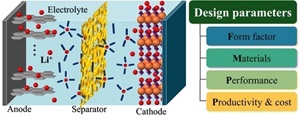No one is able to follow the flow of total global new technologies news. In early 90’s, the scientific articles predicted that in 20’s of the next century there will be a new technology introduced per 45 days. Now, the technoholic (this word is created by the PIMI Editorial-Team) people are witnessing of introduction of new technologies per minute. So, our team is trying to select the best of it based on the infografhic of our readers. The following article shows that how the humankind can convert wastes to energy sources. Reminding that, all selected articles have been re-edited and more rich by addition of hyperlinks and extra images.
******************************************
The development of efficient energy storage solutions is key to our sustainable energy future, and a recent study has shown that waste oil can be repurposed to help support that goal.
goal.
Researchers from Tongji University and the University of Shanghai for Science and Technology have introduced an innovative method for transforming oil into high-quality electrode materials essential in building supercapacitors, as Tech Xplore detailed.
 lithium-ion batteries.
lithium-ion batteries.To resolve this, the outlet explained, scientists have explored “advanced carbon materials with intricate porous structures and strategically placed nitrogen atoms, a process known as heteroatom doping,” and waste oil is a great source.
 “By using waste oil as a precursor, we’re not only recycling waste into a valuable resource but also creating a supercapacitor material with exceptional electrochemical properties,” Dr. Suyun Xu, a leading researcher on the project, said.
“By using waste oil as a precursor, we’re not only recycling waste into a valuable resource but also creating a supercapacitor material with exceptional electrochemical properties,” Dr. Suyun Xu, a leading researcher on the project, said.
“Our approach optimizes the pore structure and uses nitrogen doping to elevate the performance of supercapacitors, opening up new possibilities for sustainable, high-efficiency energy storage.”
While lithium-ion batteries, such as those used to power electric vehicles, have great energy density, supercapacitors are more adept at rapid charging and energy delivery in short bursts, according to Futurebridge. That’s why some automakers employ them to handle the energy input from regenerative braking and deliver it to help boost acceleration in some EVs and fuel-cell hybrids.
Supercapacitors have been found to recover 53% more energy from braking than traditional batteries, which helps boost the overall efficiency of EVs. This also lowers the heat burden on lithium-ion batteries, helping to extend their lifespan.
Should the U.S. invest more in battery innovations?
Absolutely
Depends on the project
We’re investing enough
We should invest less
Click your choice to see results and speak your mind
Repurposing the remnants of dirty fuels into materials that help extend the efficiency of EVs and other green technologies helps to promote a circular economy, while also reducing the amount of waste that could otherwise end up polluting the environment.












